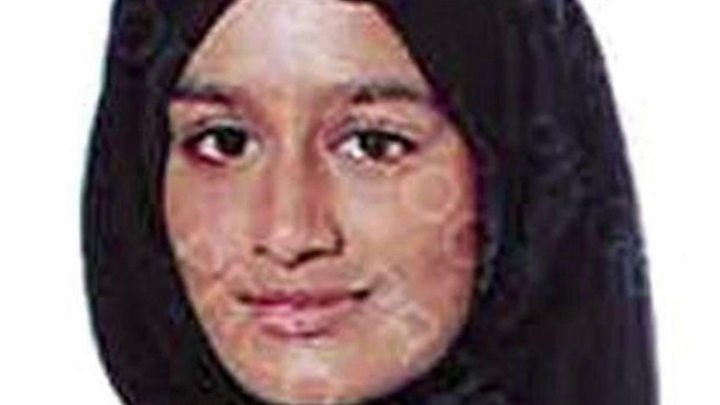
Shamima Begum is to be allowed to return to the UK to fight the decision to remove her citizenship.
So, who is she and why was her citizenship taken away?
Who is Shamima Begum?
Ms Begum is one of three east London schoolgirls who travelled to Syria to join the Islamic State group (IS) in February 2015. She was born in the UK to parents of Bangladeshi heritage and was 15 when she left.
Ms Begum travelled via Turkey to IS headquarters in Raqqa, where she married a Dutch recruit.
Image copyright Met Police Image caption Police released CCTV footage of Shamima Begum and her two friends from Gatwick AirportMs Begum, now 20, lived under IS rule for more than three years.
She was found, nine months pregnant, in a Syrian refugee camp in February 2019. The baby later died of pneumonia and Ms Begum said she had previously lost two other children.
After she was found, the then home secretary, Sajid Javid, cancelled her British citizenship on security grounds.
You can appeal in court against such a decision. Ms Begum did, and the Court of Appeal ruled that she should be allowed to return to the UK to make her case.
One of the other girls who travelled with her, Kadiza Sultana, was reportedly killed in a bombing raid, but the fate of the third - Amira Abase - is unknown.
What is citizenship?
Citizenship is the right to live in a country.
In the UK, the person enjoys the same rights as others, such as welfare, education or healthcare. They can also vote.
You could become a British citizen if:
you or your parents are born in the UK live in the UK for a period of time, normally five years marry a British citizen and have been in the UK for three yearsLast year, 159,380 people were granted British citizenship.
The UK allows people to be a citizen of more than one country.
How do you lose your citizenship?
In the UK, someone can have their citizenship stripped by the home secretary, for the following reasons:
It is "for the public good" and would not make them stateless The person obtained citizenship through fraud Their actions could harm UK interests and they can claim citizenship elsewhereMs Begum was stripped of her citizenship for the public good reason.
Under international law, it is legal to remove someone's citizenship if they are entitled to citizenship of another country.
In February, a tribunal ruled that removing Ms Begum's citizenship was lawful because she was "a citizen of Bangladesh by descent".
In many cases removing citizenship involves threats to national security, such as terrorism, or serious organised crime.
British citizens can also have their passport taken away.

Media playback is unsupported on your device
How many people have left IS to return home?
Many foreigners who travelled to Iraq and Syria to join IS did so secretly.
But data from King's College shows an estimated 52,808 men, women and children travelled to (or were born into) the areas of Iraq and Syria under IS control between 2013 and 2018.
Of these, it says about a fifth have returned home or are trying to do so.
Some countries like Russia and the Central Asian states have taken back hundreds of their nationals. But Western European countries have generally taken back far fewer, and those they have allowed to return are often children.
There are also thought to be several hundred women and children from EU countries who have made their own way back.
Returning Western European nationals
How do other countries deal with returning IS members?
After fighters travelled to Syria and Iraq, many countries changed or introduced anti-terrorism laws.
Most EU countries now manage the return of IS fighters through "criminal investigation and prosecution", according to a European Parliament report.
Countries also use deradicalisation programmes to challenge their views.
They may also seize identity cards and passports, or restrict travel.
Child returnees are generally seen by child care professionals, or placed in juvenile detention.

 5 years ago
684
5 years ago
684 

